Factors affecting the environmental management accounting implementation and the quality of environmental information for making decisions of fishery processing enterprises in Vietnam
Due to increase in global pressures and interest in environmental issues over the past two decades,
Environmental Management Accounting (EMA) has been emerged as a new technique in accounting
field in order to provide information based on environmental issues for various parties. The
environmental accounting information disclosure benefits the decision makers for managing and improving
environmental performance. This study aims to assess factors affecting the Environmental Management
Accounting Implementation and affecting the Quality of Environmental Information for making
decisions of Fishery Processing Enterprises (FPEs) in Vietnam. There are 3 groups of factors including
Company’s nature and perspective; Government and Stakeholders’ Pressure; Methods, tools and
regulations for EMA which are examined to learn about their impacts on EMA Implementation and
Environmental Data Quality for decision making of FPEs in Vietnam. The result showed that the 3
factors had a causal relationship with EMA Implementation. At the same time, EMA Implementation
has the positive impact on Environmental Data quality for decision making of the FPEs in Vietnam.
Based on the results of survey and data processing, the authors propose FPEs in Vietnam to increase
the effectiveness of methods and tools for EMA, be more responsible for government and
stakeholders’ pressure, promote managers’ perspectives related to environmental issues, and enhance
EMA implementation, from which to increase the quality of environmental data for decision making.
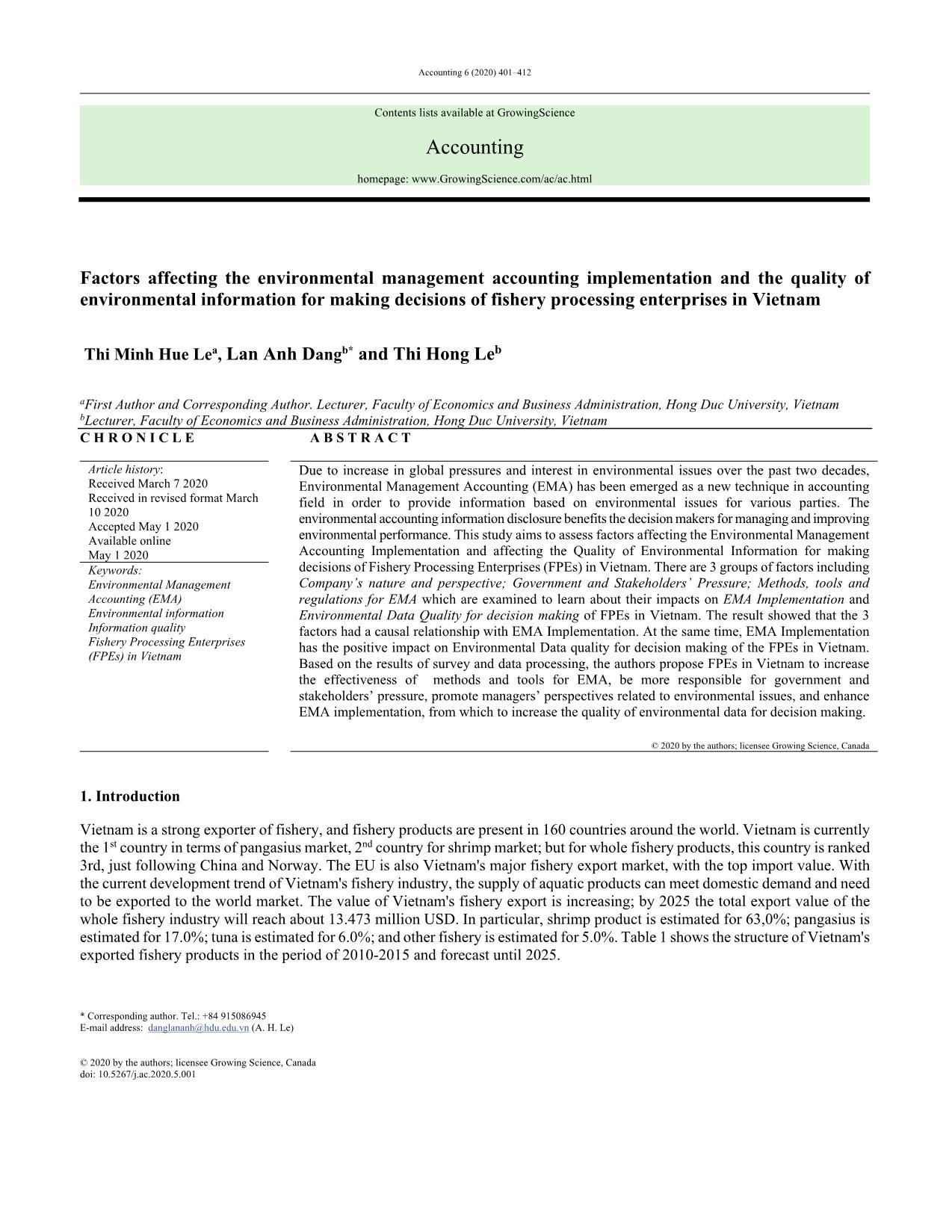
Trang 1
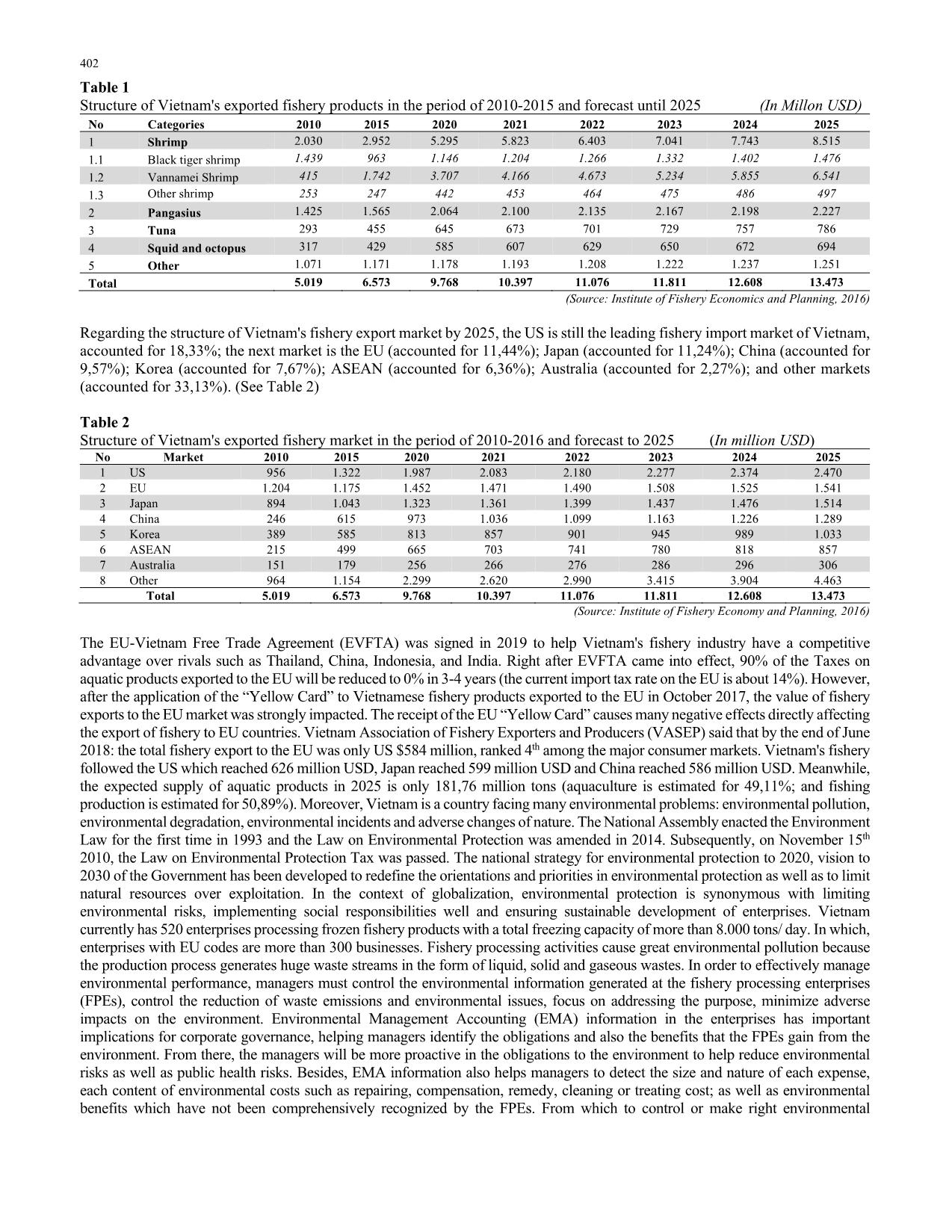
Trang 2
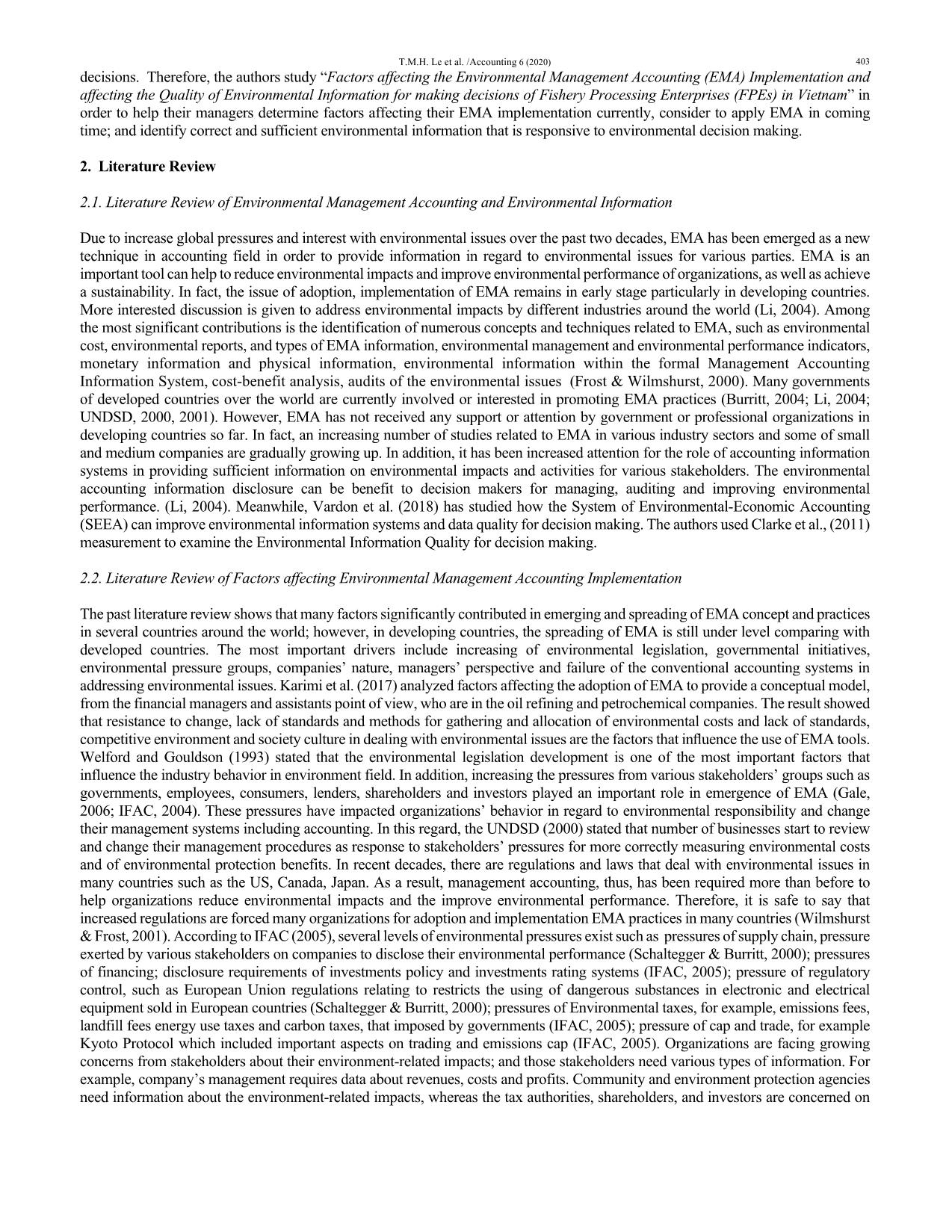
Trang 3
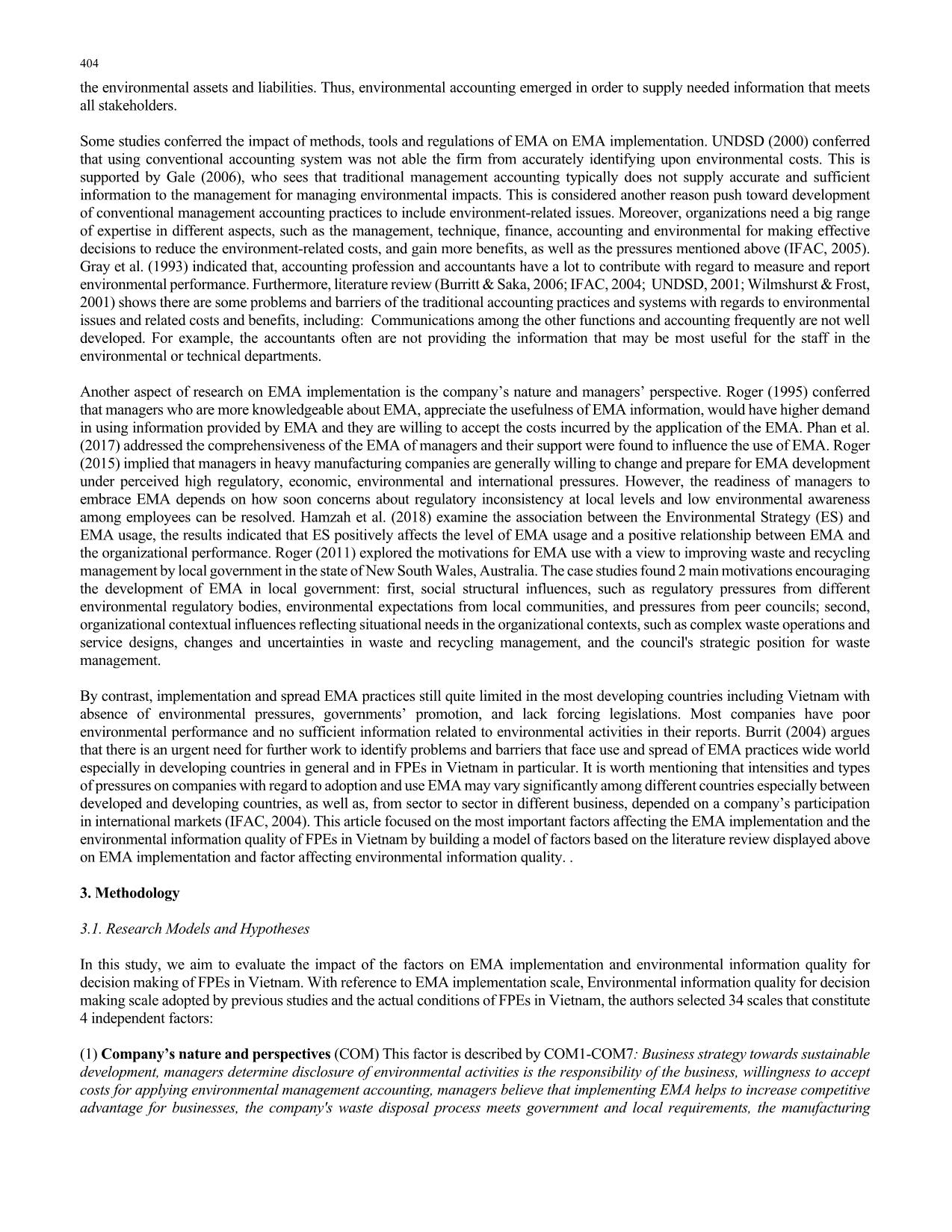
Trang 4
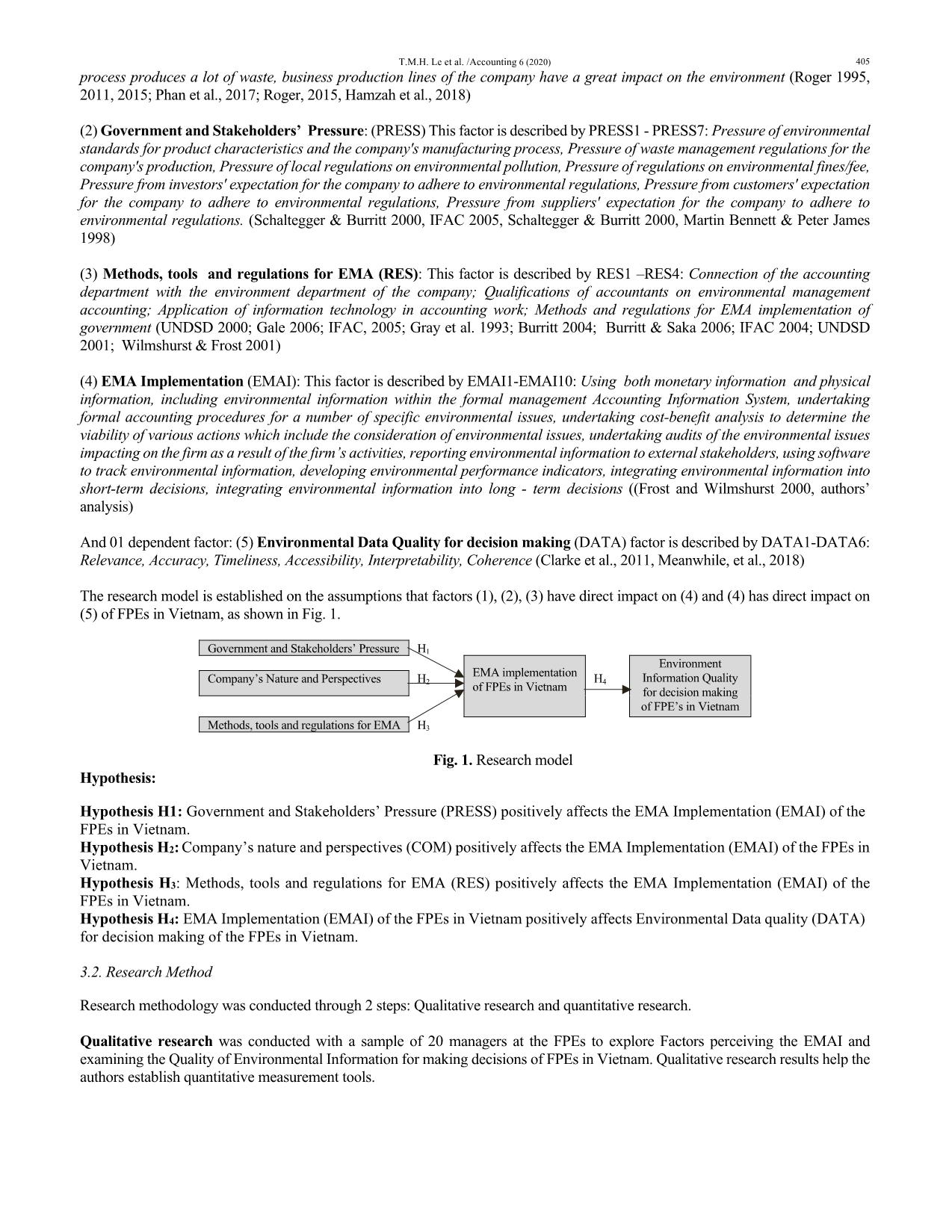
Trang 5
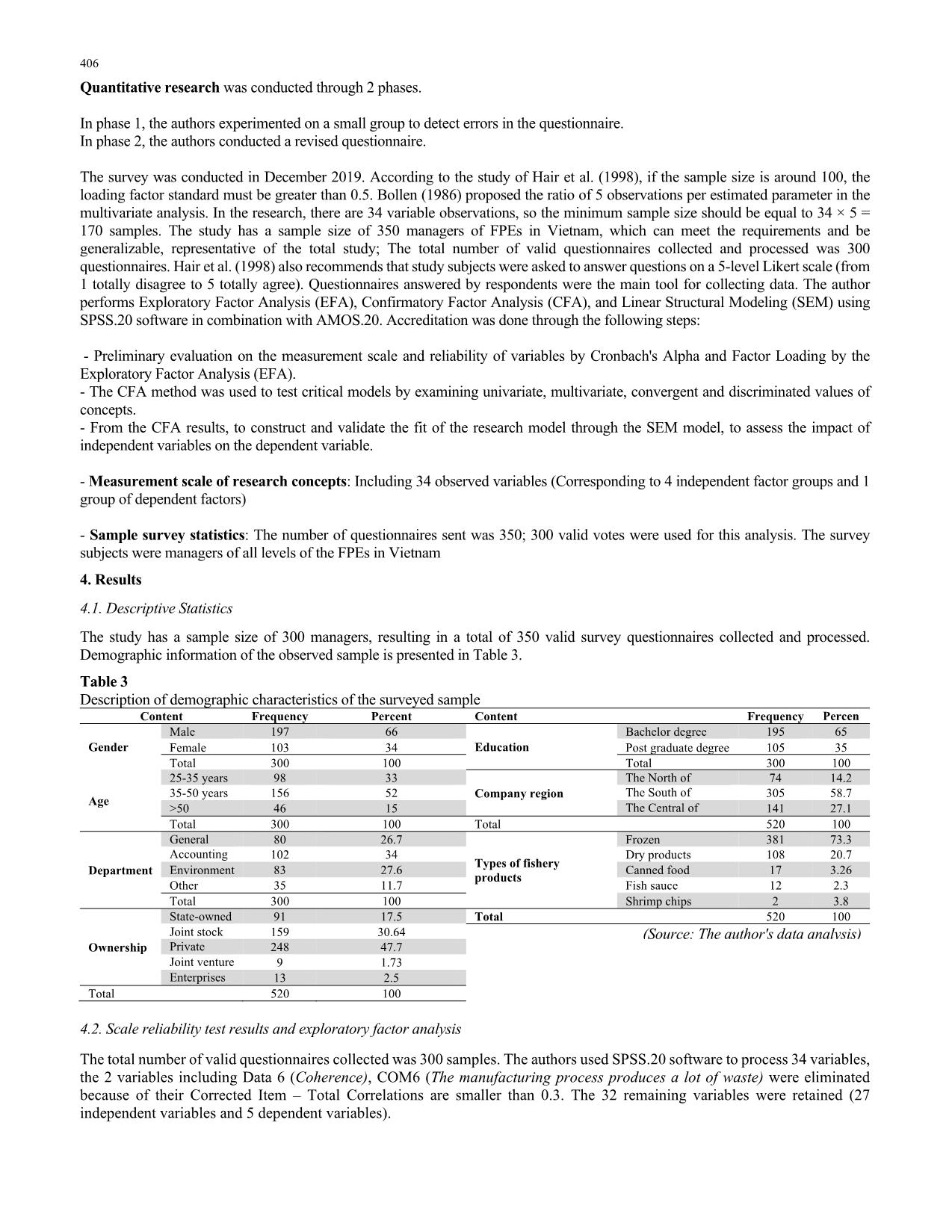
Trang 6
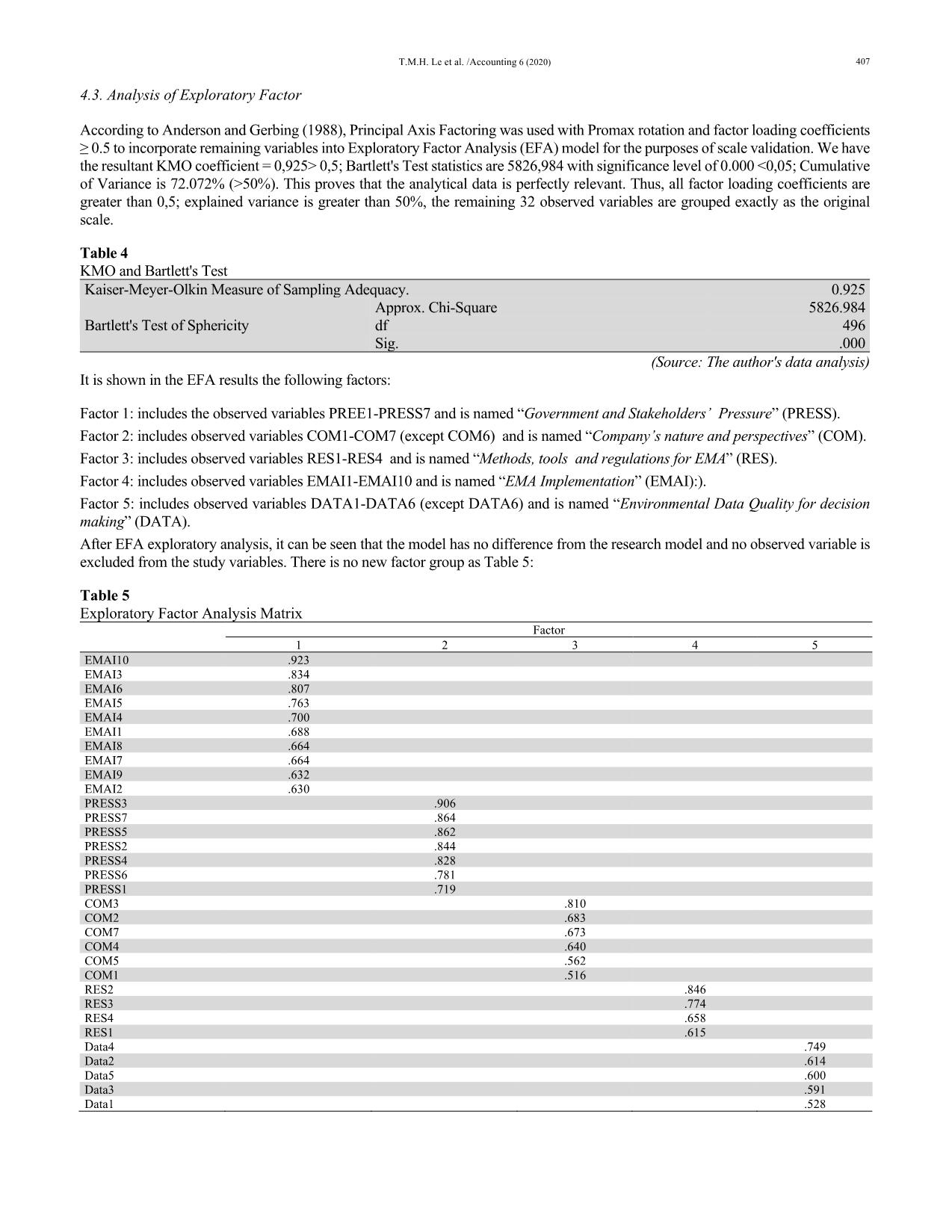
Trang 7
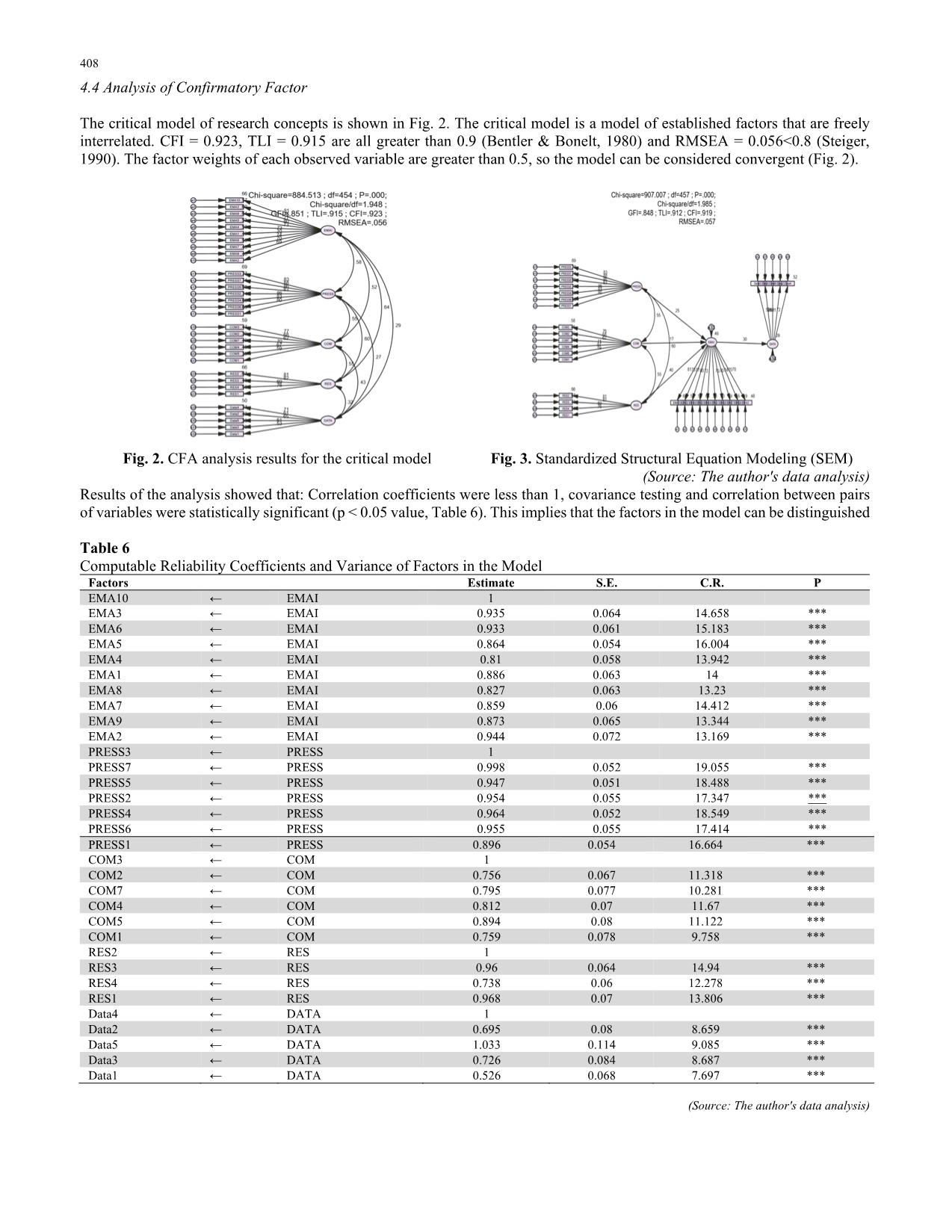
Trang 8
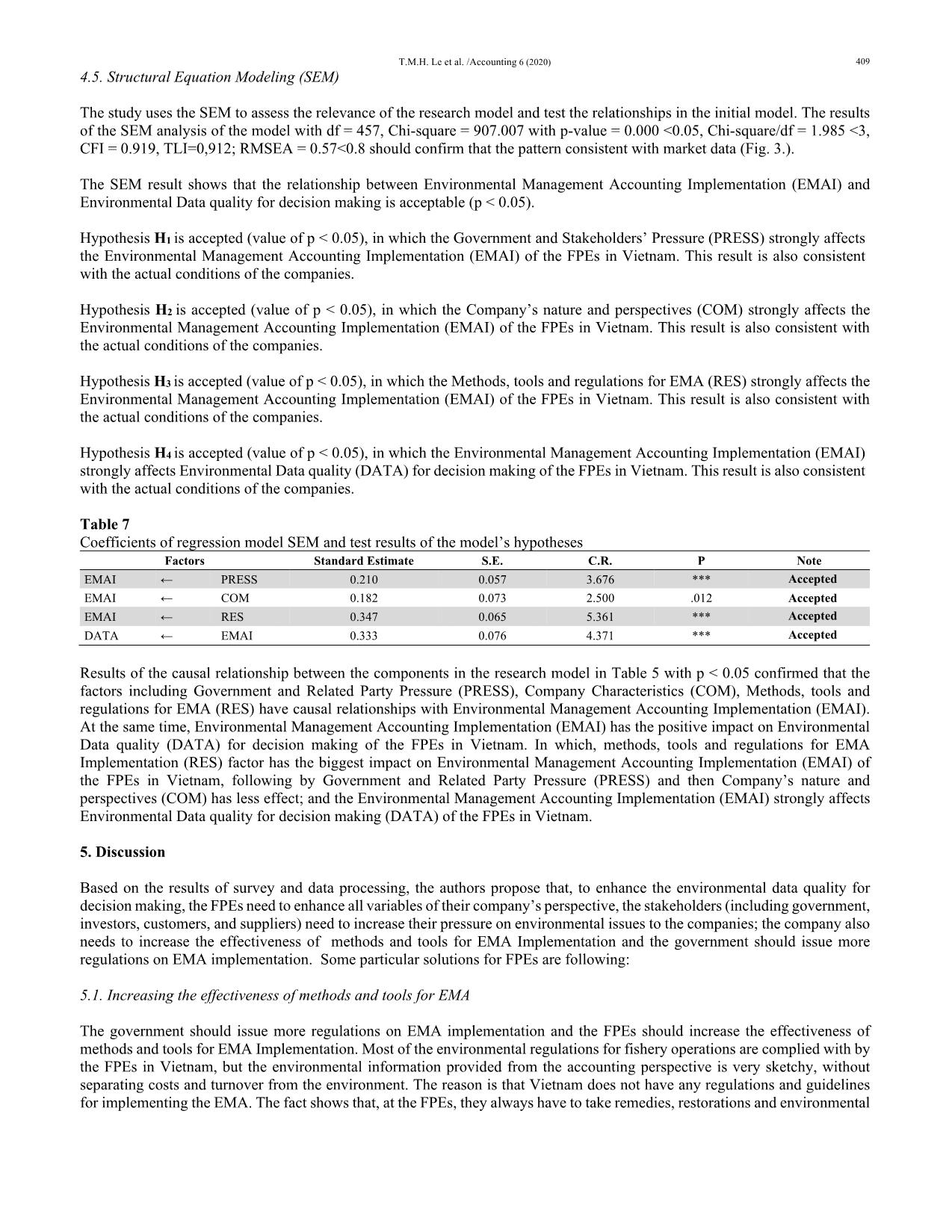
Trang 9
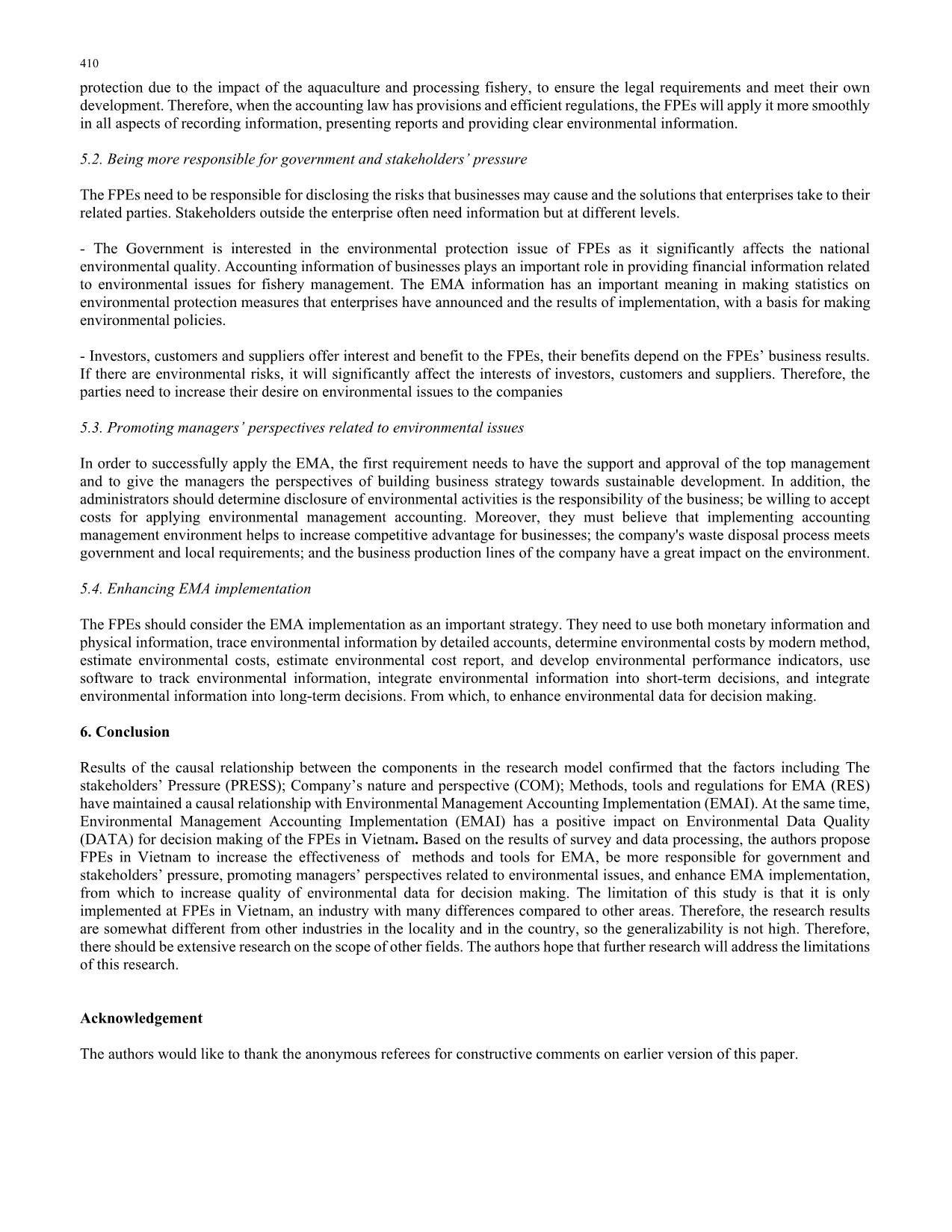
Trang 10
Tải về để xem bản đầy đủ
Tóm tắt nội dung tài liệu: Factors affecting the environmental management accounting implementation and the quality of environmental information for making decisions of fishery processing enterprises in Vietnam
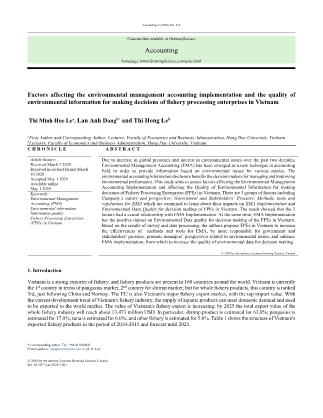
were statistically significant (p < 0.05 value, Table 6). This implies that the factors in the model can be distinguished Table 6 Computable Reliability Coefficients and Variance of Factors in the Model Factors Estimate S.E. C.R. P EMA10 ← EMAI 1 EMA3 ← EMAI 0.935 0.064 14.658 *** EMA6 ← EMAI 0.933 0.061 15.183 *** EMA5 ← EMAI 0.864 0.054 16.004 *** EMA4 ← EMAI 0.81 0.058 13.942 *** EMA1 ← EMAI 0.886 0.063 14 *** EMA8 ← EMAI 0.827 0.063 13.23 *** EMA7 ← EMAI 0.859 0.06 14.412 *** EMA9 ← EMAI 0.873 0.065 13.344 *** EMA2 ← EMAI 0.944 0.072 13.169 *** PRESS3 ← PRESS 1 PRESS7 ← PRESS 0.998 0.052 19.055 *** PRESS5 ← PRESS 0.947 0.051 18.488 *** PRESS2 ← PRESS 0.954 0.055 17.347 *** PRESS4 ← PRESS 0.964 0.052 18.549 *** PRESS6 ← PRESS 0.955 0.055 17.414 *** PRESS1 ← PRESS 0.896 0.054 16.664 *** COM3 ← COM 1 COM2 ← COM 0.756 0.067 11.318 *** COM7 ← COM 0.795 0.077 10.281 *** COM4 ← COM 0.812 0.07 11.67 *** COM5 ← COM 0.894 0.08 11.122 *** COM1 ← COM 0.759 0.078 9.758 *** RES2 ← RES 1 RES3 ← RES 0.96 0.064 14.94 *** RES4 ← RES 0.738 0.06 12.278 *** RES1 ← RES 0.968 0.07 13.806 *** Data4 ← DATA 1 Data2 ← DATA 0.695 0.08 8.659 *** Data5 ← DATA 1.033 0.114 9.085 *** Data3 ← DATA 0.726 0.084 8.687 *** Data1 ← DATA 0.526 0.068 7.697 *** (Source: The author's data analysis) T.M.H. Le et al. /Accounting 6 (2020) 409 4.5. Structural Equation Modeling (SEM) The study uses the SEM to assess the relevance of the research model and test the relationships in the initial model. The results of the SEM analysis of the model with df = 457, Chi-square = 907.007 with p-value = 0.000 <0.05, Chi-square/df = 1.985 <3, CFI = 0.919, TLI=0,912; RMSEA = 0.57<0.8 should confirm that the pattern consistent with market data (Fig. 3.). The SEM result shows that the relationship between Environmental Management Accounting Implementation (EMAI) and Environmental Data quality for decision making is acceptable (p < 0.05). Hypothesis H1 is accepted (value of p < 0.05), in which the Government and Stakeholders’ Pressure (PRESS) strongly affects the Environmental Management Accounting Implementation (EMAI) of the FPEs in Vietnam. This result is also consistent with the actual conditions of the companies. Hypothesis H2 is accepted (value of p < 0.05), in which the Company’s nature and perspectives (COM) strongly affects the Environmental Management Accounting Implementation (EMAI) of the FPEs in Vietnam. This result is also consistent with the actual conditions of the companies. Hypothesis H3 is accepted (value of p < 0.05), in which the Methods, tools and regulations for EMA (RES) strongly affects the Environmental Management Accounting Implementation (EMAI) of the FPEs in Vietnam. This result is also consistent with the actual conditions of the companies. Hypothesis H4 is accepted (value of p < 0.05), in which the Environmental Management Accounting Implementation (EMAI) strongly affects Environmental Data quality (DATA) for decision making of the FPEs in Vietnam. This result is also consistent with the actual conditions of the companies. Table 7 Coefficients of regression model SEM and test results of the model’s hypotheses Factors Standard Estimate S.E. C.R. P Note EMAI ← PRESS 0.210 0.057 3.676 *** Accepted EMAI ← COM 0.182 0.073 2.500 .012 Accepted EMAI ← RES 0.347 0.065 5.361 *** Accepted DATA ← EMAI 0.333 0.076 4.371 *** Accepted Results of the causal relationship between the components in the research model in Table 5 with p < 0.05 confirmed that the factors including Government and Related Party Pressure (PRESS), Company Characteristics (COM), Methods, tools and regulations for EMA (RES) have causal relationships with Environmental Management Accounting Implementation (EMAI). At the same time, Environmental Management Accounting Implementation (EMAI) has the positive impact on Environmental Data quality (DATA) for decision making of the FPEs in Vietnam. In which, methods, tools and regulations for EMA Implementation (RES) factor has the biggest impact on Environmental Management Accounting Implementation (EMAI) of the FPEs in Vietnam, following by Government and Related Party Pressure (PRESS) and then Company’s nature and perspectives (COM) has less effect; and the Environmental Management Accounting Implementation (EMAI) strongly affects Environmental Data quality for decision making (DATA) of the FPEs in Vietnam. 5. Discussion Based on the results of survey and data processing, the authors propose that, to enhance the environmental data quality for decision making, the FPEs need to enhance all variables of their company’s perspective, the stakeholders (including government, investors, customers, and suppliers) need to increase their pressure on environmental issues to the companies; the company also needs to increase the effectiveness of methods and tools for EMA Implementation and the government should issue more regulations on EMA implementation. Some particular solutions for FPEs are following: 5.1. Increasing the effectiveness of methods and tools for EMA The government should issue more regulations on EMA implementation and the FPEs should increase the effectiveness of methods and tools for EMA Implementation. Most of the environmental regulations for fishery operations are complied with by the FPEs in Vietnam, but the environmental information provided from the accounting perspective is very sketchy, without separating costs and turnover from the environment. The reason is that Vietnam does not have any regulations and guidelines for implementing the EMA. The fact shows that, at the FPEs, they always have to take remedies, restorations and environmental 410 protection due to the impact of the aquaculture and processing fishery, to ensure the legal requirements and meet their own development. Therefore, when the accounting law has provisions and efficient regulations, the FPEs will apply it more smoothly in all aspects of recording information, presenting reports and providing clear environmental information. 5.2. Being more responsible for government and stakeholders’ pressure The FPEs need to be responsible for disclosing the risks that businesses may cause and the solutions that enterprises take to their related parties. Stakeholders outside the enterprise often need information but at different levels. - The Government is interested in the environmental protection issue of FPEs as it significantly affects the national environmental quality. Accounting information of businesses plays an important role in providing financial information related to environmental issues for fishery management. The EMA information has an important meaning in making statistics on environmental protection measures that enterprises have announced and the results of implementation, with a basis for making environmental policies. - Investors, customers and suppliers offer interest and benefit to the FPEs, their benefits depend on the FPEs’ business results. If there are environmental risks, it will significantly affect the interests of investors, customers and suppliers. Therefore, the parties need to increase their desire on environmental issues to the companies 5.3. Promoting managers’ perspectives related to environmental issues In order to successfully apply the EMA, the first requirement needs to have the support and approval of the top management and to give the managers the perspectives of building business strategy towards sustainable development. In addition, the administrators should determine disclosure of environmental activities is the responsibility of the business; be willing to accept costs for applying environmental management accounting. Moreover, they must believe that implementing accounting management environment helps to increase competitive advantage for businesses; the company's waste disposal process meets government and local requirements; and the business production lines of the company have a great impact on the environment. 5.4. Enhancing EMA implementation The FPEs should consider the EMA implementation as an important strategy. They need to use both monetary information and physical information, trace environmental information by detailed accounts, determine environmental costs by modern method, estimate environmental costs, estimate environmental cost report, and develop environmental performance indicators, use software to track environmental information, integrate environmental information into short-term decisions, and integrate environmental information into long-term decisions. From which, to enhance environmental data for decision making. 6. Conclusion Results of the causal relationship between the components in the research model confirmed that the factors including The stakeholders’ Pressure (PRESS); Company’s nature and perspective (COM); Methods, tools and regulations for EMA (RES) have maintained a causal relationship with Environmental Management Accounting Implementation (EMAI). At the same time, Environmental Management Accounting Implementation (EMAI) has a positive impact on Environmental Data Quality (DATA) for decision making of the FPEs in Vietnam. Based on the results of survey and data processing, the authors propose FPEs in Vietnam to increase the effectiveness of methods and tools for EMA, be more responsible for government and stakeholders’ pressure, promoting managers’ perspectives related to environmental issues, and enhance EMA implementation, from which to increase quality of environmental data for decision making. The limitation of this study is that it is only implemented at FPEs in Vietnam, an industry with many differences compared to other areas. Therefore, the research results are somewhat different from other industries in the locality and in the country, so the generalizability is not high. Therefore, there should be extensive research on the scope of other fields. The authors hope that further research will address the limitations of this research. Acknowledgement The authors would like to thank the anonymous referees for constructive comments on earlier version of this paper. T.M.H. Le et al. /Accounting 6 (2020) 411 References Anderson, J. C., & Gerbing, D. W. (1988). Structural equation modeling in practice: A review and recommended two-step approach. Psychological Bulletin, 103(3), 411. https://doi.org/10.1037/0033-2909.103.3.411. Bentler, P. M., & Bonett, D. G. (1980). Significance tests and goodness of fit in the analysis of covariance structures. Psychological Bulletin, 88(3), 588. DOI: 10.1037/0033-2909.88.3.588 Bollen, K. A. (1986). Sample size and Bentler and Bonett's nonnormed fit index. Psychometrika, 51(3), 375-377. https://doi.org/10.1007/BF02294061 Burritt, R. L. (2004). Environmental management accounting: Roadblocks on the way to the green and pleasant land. Business Strategy and the Environment, 13, 13-32. Burritt, R. L., & Saka, C. (2006). Environmental management accounting applications and eco-efficiency: case studies from Japan. Journal of Cleaner Production, 14(14), 1262-1275. Clarke, N., Fischer, R., de Vries, W., Lundin, L., Papale, D., Vesala, T., Merilä, P., Matteucci, G., Mirtl, M., Simpson, D., Paoletti, E., (2011). Availability, accessibility, quality and comparability of monitoring data for European forests for use in air pollution and climate change science. iForest 4, 162–166. [online 2011-08-11] URL: (Accessed 6 February 2018) Gale, R. (2006). Environmental management accounting as a reflexive modernization strategy in cleaner production. Journal of Cleaner Production, 14(14), 1228-1236. Gray, R., Bebbington, J., & Walters, D. (1993). Accounting for the Environment. Markus Wiener Pub. Hair, J. F., Black, W. C., Babin, B. J., Anderson, R. E., & Tatham, R. L. (1998). Multivariate data analysis. Upper Saddle River, NJ: Prentice Hall IFAC. (2004). International Guidelines on Environmental Management Accounting (EMA). New York: International Federation of Accountants (IFAC). IFAC. (2005). International Guidelines on Environmental Management Accounting (EMA) New York: International Federation of Accountants (IFAC). Institute of Fishery Economics and Planning. (2016). Structure of Vietnam's exported fishery products in the period of 2010- 2015 and forecast until 2025. Institute of Fishery Economy and Planning. (2016). Structure of Vietnam's exported fishery market in the period of 2010-2016 and forecast to 2025. Karimi, Z., Dastgir, M., & Saleh, M. A. (2017). Analysis of factors affecting the adoption and use of environmental management accounting to provide a conceptual model. International Journal of Economics and Financial Issues, 7(3), 555-560. Li, X. (2004). Theory and practice of environmental management accounting. International Journal of Technology Management & Sustainable Development, 3(1), 47-57. Phan, T.N., Baird, K., & Su, S. (2017). The use and effectiveness of environmental management accounting, Australasian Journal of Environmental Management, 24(2), 1-20. Roger Leonard Burritt (2015). The potential for environmental management accounting development in China. Journal of Accounting & Organizational Change, 11(3), 406-428. Roger Leonard Burritt (2011), Environmental Management Accounting in Local Government: A Case of Waste Management, Accounting Auditing & Accountability Journal, 24(January), 93-128. Schaltegger, S., & Burritt, R. L. (2000). Contemporary environmental accounting: issues, concepts, and practice. Sheffield: Greenleaf Publishing. Steiger, J. H. (1990). Structural model evaluation and modification: An interval estimation approach. Multivariate Behavioral Research, 25(2), 173-180. UNDSD. (2000). Improving Governments’ Role In the Promotion of Environmental Managerial accounting New York: United Nation. UNDSD. (2001). Environmental management accounting: procedures and principals. New York: United Nation Division for sustainable Development: Expert Working Group. Vardon, M., Castaneda, J. P., Nagy, M., & Schenau, S. (2018). How the System of Environmental-Economic Accounting can improve environmental information systems and data quality for decision making. Environmental science & policy, 89, 83- 92 Welford, R., & Gouldson, A. (1993). Environmental management and business strategy: London Pitman. Wilmshurst, T. D., & Frost, G. R. (2001). The role of accounting and the accountant in the environmental management system. Business Strategy and the Environment, 10(3). 135. 412 © 2020 by the authors; licensee Growing Science, Canada. This is an open access article distributed under the terms and conditions of the Creative Commons Attribution (CC-BY) license (
File đính kèm:
 factors_affecting_the_environmental_management_accounting_im.pdf
factors_affecting_the_environmental_management_accounting_im.pdf

